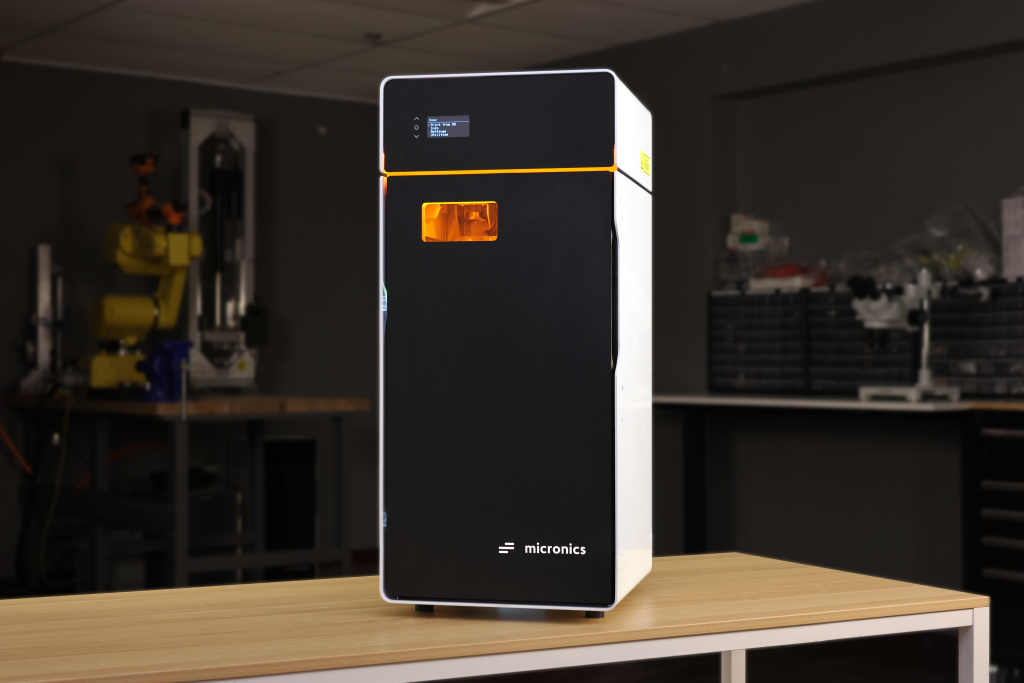Resin 3D printer manufacturer Formlabs has acquired Micronics, a Wisconsin-based 3D printing startup developing accessible Selective Laser Sintering (SLS) 3D printers.
Co-founded by Henry Chan and Luke Boppart, Micronics has generated notable interest since launching the Kickstarter campaign for Micron, its first desktop SLS 3D printer, last month. The company successfully raised $1,357,939 of its initial $100,000 goal from over 400 backers, before fundraising was cancelled after the acquisition.
“We are thrilled to join forces with Formlabs, a company we have long admired,” commented Chan, CEO of Micronics. “After the outpouring of excitement around our Kickstarter, we’re confident that this move will enable us to bring the best SLS 3D printing experience to users around the world by leveraging the incredible talent and experience at Formlabs.”
Following the acquisition, Chan and Boppart have ceased development of the Micron 3D printer. Instead, they have joined Formlabs’ R&D team to “bring the next generation of accessible SLS printers to market.” These products will reportedly “look very similar” to the work done at Micronics, making SLS technology “much more affordable and easy to use.”
All Micronics’ Kickstarter backers will receive a full refund of their pledges and $1,000 in Formlabs credit. Valid for five years, this credit can be used for any current or future Formlabs product. Backers will also be gifted a free Open Materials License for Formlabs 3D printers.
Formlabs has been contacted for comment on the price of the deal. This article will be updated if this information is provided.
Formlabs acquires Micronics
Micronics’ Micron 3D printer was designed to bring industrial-grade SLS 3D printing capabilities to the desktop market.
Targeting professionals and hobbyists, Micronics technology can 3D print complex parts without support structures. This is enabled by a high-power laser that fuses layers of plastic powder. Unfused powder surrounds the fabricated part, acting as a natural support during 3D printing.
While the Micron project has been shelved, Micronics’ technology will reportedly feature in future Formlabs products. Chan and Boppart, via an FAQ on the Micronics website, claim the acquisition offered the “best and fastest opportunity” to launch affordable and easy-to-use SLS 3D printers to market.
The decision to purchase Micronics is notable for its speed. Formlabs’ CEO Max Lobovsky met Chan and Boppart for the first time last month at Open Sauce 2024 in San Francisco.
Lobovsky claims the trio immediately “discovered our shared vision for accessible, powerful 3D printing.” He added their “talent and innovative spirit will help us to accelerate accessible SLS 3D printing to market and enable anyone to bring their ideas to life.”
SLS 3D printing is nothing new at Formlabs. The company’s Fuse 1 Series accounts for over half of the powder bed fusion 3D printers sold worldwide. The addition of the Micronics team will reportedly enable Formlabs to accelerate its SLS capabilities.

Consolidation in the 3D printing industry
Formlabs’ decision to purchase Micronics follows its successful acquisition of Spectra Group Photopolymers LLC. in 2019. The company claims this deal built out its 3D printing material capabilities, adding an ISO 13485-certified facility to its ecosystem.
At the time, Lobovsky claimed that vertical integration was a key driver behind this acquisition. “Most 3D printing companies are not vertically integrated and don’t have access to their own resin manufacturing,” he stated. “We believe materials are a critical component in opening up new applications, workflows and disrupting industries.”
Market consolidation is currently a key theme in the additive manufacturing industry. Certain 3D printer manufacturers view this as a vital step to increasing adoption and achieving profitability.
During RAPID + TCT 2024, Nano Dimension CEO Yoav Stern stated that “scalability will only come from consolidation.” This sentiment was subsequently affirmed when the Israeli electronics 3D printer manufacturer announced it had acquired Desktop Metal in a $183 million all-cash deal.
Nano Dimension’s acquisition of Desktop Metal will create what Stern has called a “larger, more diversified global innovative company.” This will reportedly improve customer support and generate “long-term value creation for shareholders,” to achieve “profitable growth.”
Elsewhere, industrial 3D printing solutions provider Vision Miner recently announced the acquisition of AddWise in a deal valued at $14 million. Through this deal, Vision Minor plans to bolster its internal manufacturing capabilities and grow its global footprint. Patrick Smith, the company’s Founder & CEO, called the deal a “transformative milestone” for the company.
Register now for AMAA 2024 to hear insights from industry experts on additive manufacturing in aerospace, space, and defense.
Want to help select the winners of the 2024 3D Printing Industry Awards? Join the Expert Committee today.
What does the future of 3D printing hold?
What near-term 3D printing trends have been highlighted by industry experts?
Subscribe to the 3D Printing Industry newsletter to keep up to date with the latest 3D printing news.
You can also follow us on Twitter, like our Facebook page, and subscribe to the 3D Printing Industry Youtube channel to access more exclusive content.
Featured image shows Formlabs CEO Max Lobovsky (left) and Micronics CEO Henry Chan (right). Photo via Formlabs.


